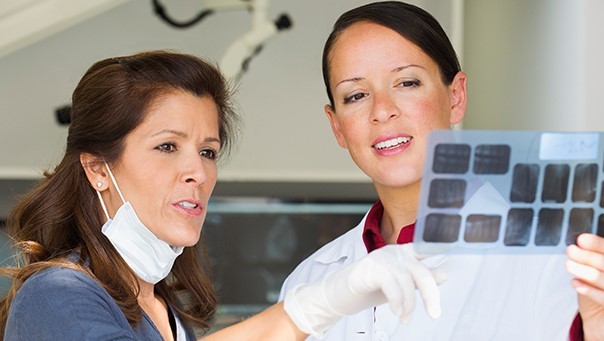-
-

BRUSHING & FLOSSING
How to BrushWhat Is the Right Way to Brush?
Proper brushing takes at least two minutes — that's right, 120 seconds!...

BRUSHING & FLOSSING
How To FlossWhat is the Right Way to Floss?
Proper flossing removes plaque and food particles in places where a toothbrush cannot easily reach... -
Science & Innovation
- Home
- Oral Health
- Cancer
- Signs of Lip Cancer


Lip cancer doesn't get as much attention as other types of skin cancer, but it's not an uncommon condition.
How it Happens
Exposure to ultraviolet (UV) radiation is the major risk factor for developing this type of cancer. Because UV rays primarily come from sunlight, you may already know to apply sunscreen to exposed skin. But don't forget to protect your lips, too. Smoking and alcohol consumption have also been associated with lip cancer, but to a lesser extent.
Lip Cancer Warning Signs
Many visible irregularities can signal the development of lip cancer, as described by Cancer Council Australia. You may notice a white or red patch on your lip that becomes crusty or itchy, or bleeds; or swelling. You may also notice open sores on your lips, and although these may look or feel like cold sores, they won't heal the same way. Keep in mind that the warning signs of lip cancer can be present as merely a pale area that looks like a scar – or they may look different from these descriptions entirely. If you notice a change in your lips' appearance, you should always get it examined by your dentist.
Dianosis & Treatment
Early Diagnosis
Early diagnosis is very important, as lip cancers are almost always curable when they're caught early. To this end, you need to check your lips regularly for changes that could be signs of cancer. It's also important to see your dentist for scheduled oral cancer screenings, during which time he or she will examine your lips and the rest of your mouth for tissues that could be cancerous – visibly or otherwise. If any suspicious tissue is found, it can be biopsied.
Lip Cancer Treatment
There are a number of methods used to treat this type of cancer, according to the Australasian College of Dermatologists. One is a style of surgery wherein the affected tissue on your lip is removed, along with some of the surrounding healthy tissue, to make sure all cancerous cells are eliminated. Sometimes regional lymph nodes may also be removed. Because your lips are a highly visible part of your body, your dentist may refer you to a plastic surgeon to restore them to their original appearance.
Radiation therapy is another treatment that is used. This process applies X-rays and other sources of radiation to kill the cancer cells that have grown in the affected area. Be sure to arrange a dental exam before you receive radiation therapy, so that existing dental problems like gum disease or dental decay can be treated first.
Lip cancer can be treated if it's found early, so make sure you're paying attention to your lips and seeing your dentist regularly for oral cancer screenings. Remember that this article is not meant for self-diagnosis; if you notice any changes, your first step should be to make an appointment with your dentist or doctor straight away.
Related Articles

If you have been experiencing problems with a tooth, you may wonder, "Do I need a root canal filling?" Root canal fillings, also known as endodontic therapy, are performed when the nerve or pulp of the tooth becomes infected

When people are told that they need a root canal therapy, they often worry that it's going to be painful.

The goal of the root canal therapy is to save a tooth that is severely infected. As Dental Health Services Victoria puts it, a dentist performs the procedure to replace damaged or infected pulp in the tooth's root canal with a root filling.
This article is intended to promote understanding of and knowledge about general oral health topics. It is not intended to be a substitute for professional advice, diagnosis or treatment. Always seek the advice of your dentist or other qualified healthcare provider with any questions you may have regarding a medical condition or treatment.
Related Products

Helping dental professionals
More professionals across the world trust Colgate. Find resources, products, and information to give your patients a healthier future








